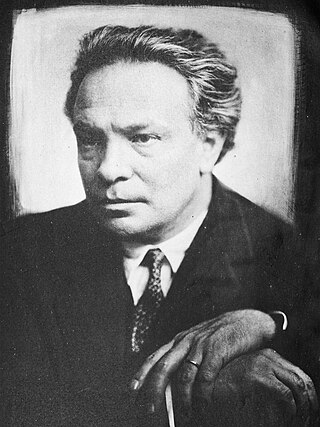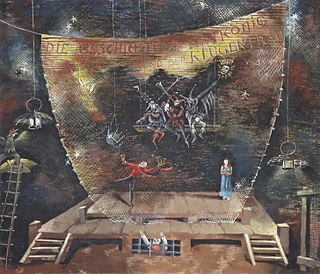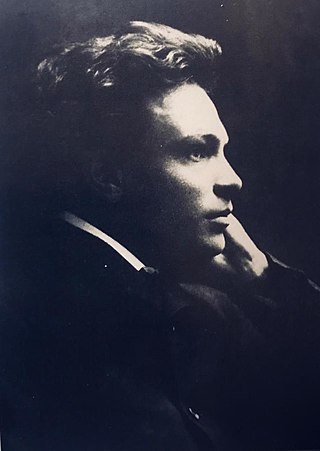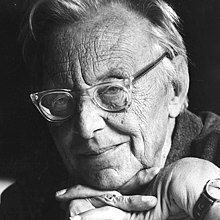
The English Cat is an opera in two acts by Hans Werner Henze to an English libretto by Edward Bond, based on Les peines de coeur d'une chatte anglaise by Honoré de Balzac. The opera was first performed in a German translation by the Stuttgart Opera at the Schlosstheater Schwetzingen at the Schwetzingen Festival on 2 June 1983. The French premiere was at the Opéra-Comique, Paris in 1984. The first performance using the original English text was at Santa Fe on 13 July 1985. The UK premiere was at the Leith Theatre, Edinburgh, on 19 August 1987. A revised version was performed at Montepulciano in 1990 and this was given in London in 1991.

Die Frau ohne Schatten, Op. 65, is an opera in three acts by Richard Strauss with a libretto by his long-time collaborator, the poet Hugo von Hofmannsthal. It was written between 1911 and either 1915 or 1917. When it premiered at the Vienna State Opera on 10 October 1919, critics and audiences were unenthusiastic. Many cited problems with Hofmannsthal's complicated and heavily symbolic libretto. However, it is now a standard part of the operatic repertoire.

Der Zwerg, Op. 17, is an opera in one act by Austrian composer Alexander von Zemlinsky to a libretto by Georg C. Klaren, freely adapted from the short story "The Birthday of the Infanta" by Oscar Wilde.

Eine florentinische Tragödie, Op. 16, is an opera in one act by Alexander von Zemlinsky composed in 1915–16 to a libretto adapted by the composer from a German translation by Max Meyerfeld of Oscar Wilde's unfinished play A Florentine Tragedy.

La campana sommersa is an opera in four acts by Italian composer Ottorino Respighi. Its libretto is by Claudio Guastalla, based on the play Die versunkene Glocke by German author Gerhart Hauptmann. The opera's premiere was on 18 November 1927 in Hamburg, Germany. Respighi's regular publisher, Ricordi, was displeased by his choice of subject, and refused to publish the opera. This led to its being published by the German publisher Bote & Bock, and a German premiere.

Der Traumgörge, Op. 11, is an opera in two acts and an epilogue by Austrian composer Alexander Zemlinsky. The libretto was written by Leo Feld based on the fairy tale "Vom unsichtbaren Königreiche" by Richard von Volkmann and the poem "Der arme Peter" by Heinrich Heine.

The Bassarids is an opera in one act and an intermezzo, with music by Hans Werner Henze to an English libretto by W. H. Auden and Chester Kallman, after Euripides's The Bacchae.

König Hirsch is an opera in three acts by Hans Werner Henze to a German libretto by Heinz von Cramer after Il re cervo, a theatrical fable (1762) by Carlo Gozzi. He revised it as Il re cervo, premiered in 1963 at the Staatstheater Kassel.

Moses und Aron is a three-act opera by Arnold Schoenberg with the music to the third act unfinished. The German libretto is by the composer after the Book of Exodus.

Die Kluge. Die Geschichte von dem König und der klugen Frau is an opera in 12 scenes written by Carl Orff. It premiered at the Frankfurt Opera, Germany, on 20 February 1943. Orff referred to this opera as a Märchenoper. The composer also wrote the libretto, based on "Die Kluge Bauerntochter" from Grimms' Fairy Tales. A performance lasts for about 90 minutes and is often paired with Orff's Der Mond.

Lear is an opera in two parts with music by the German composer Aribert Reimann, and a libretto by Claus H. Henneberg, based on Shakespeare's tragedy King Lear.
The Wooden Prince, Op. 13, Sz. 60, is a one-act pantomime ballet composed by Béla Bartók in 1914–1916 to a scenario by Béla Balázs. It was first performed at the Budapest Opera on 12 May 1917 under the conductor Egisto Tango.

The Perfect Fool is an opera in one act with music and libretto by the English composer Gustav Holst. Holst composed the work over the period of 1918 to 1922. The opera received its premiere at the Covent Garden Theatre, London, on 14 May 1923. Holst had originally asked Clifford Bax to write the libretto, but Bax declined.

Belfagor is an Italian-language opera by the composer Ottorino Respighi to a libretto by Claudio Guastalla (1880–1948) based on the comedy Belfagor of Ercole Luigi Morselli (1882–1921), itself loosely based on the novella Belfagor arcidiavolo by Niccolò Machiavelli. It was premiered in 1923 at La Scala in Milan, under the baton of Antonio Guarnieri, since Toscanini was unavailable. The cast featured Irish soprano Margaret Burke Sheridan as Candida, baritone Mariano Stabile as her lover Baldo, and tenor Francesco Merli as the titular Belfagor, an arcidiavolo (Archdemon) who tries to marry a human maiden while in disguise as a nobleman, using gifts of money to her father.

Die Gezeichneten is an opera in three acts by Franz Schreker with a German-language libretto by the composer, based on Frank Wedekind's play Hidalla.

Kleider machen Leute is a comic opera in a prologue and two acts by Austrian composer Alexander Zemlinsky. The libretto was written by Leo Feld, based on the 1874 novella of the same name by Gottfried Keller.

Lucrezia is an opera in one act and three tableaux by Ottorino Respighi to a libretto by Claudio Guastalla, after Livy and William Shakespeare's The Rape of Lucrece, itself based heavily on Ovid's Fasti. Respighi died before finishing the work, which was therefore completed by his wife, Elsa Respighi, and by one of his pupils, Ennio Porrino. Lucrezia premiered on 24 February 1937 at the Teatro alla Scala in Milan, in a production directed by Mario Frigerio with sets designed by Pietro Aschieri. The première had a good reception.

Semirâma is an opera in three acts by Ottorino Respighi to a libretto by Alessandro Cerè based on Voltaire's 1748 play Sémiramis, the same subject used for Rossini's Semiramide. Semirâma premiered on 20 November 1910 at the Teatro Comunale di Bologna. The première obtained a great success, with several calls for the composer and the singers.

La bella dormente nel bosco is an opera in three acts by Ottorino Respighi to a libretto by Gian Bistolfi based on Charles Perrault's fairy tale "Sleeping Beauty".

Aladdin or Aladin, Op. 43, is an opera by the Swedish composer Kurt Atterberg, to a libretto written by Bruno Hardt-Warden and Ignaz Michael Welleminsky. Two versions exist, in Swedish and German. The opera is based on the story, "Aladdin's Magic Lamp" from One Thousand and One Nights. It was first performed on 18 March 1941 at the Royal Swedish Opera, Stockholm.














